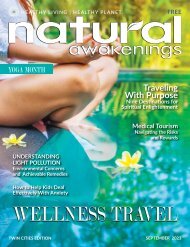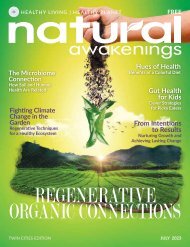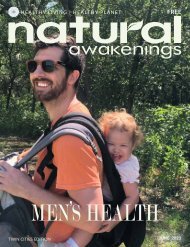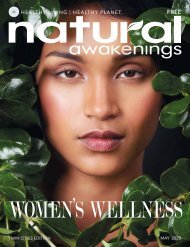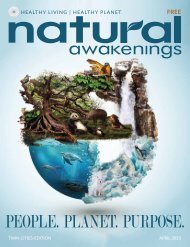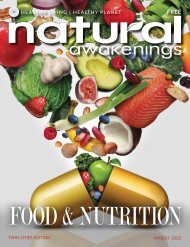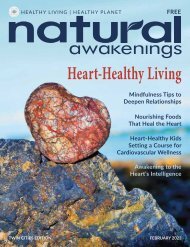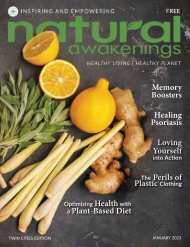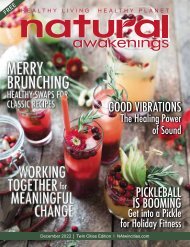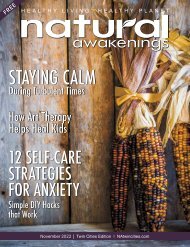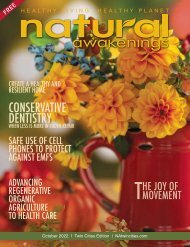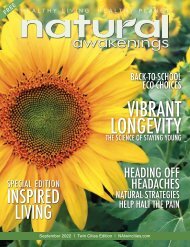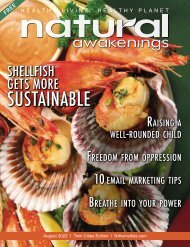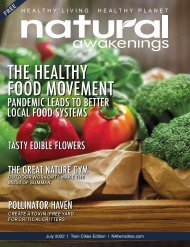Natural Awakenings Twin Cities January 2022
Read the January 2022 edition of Natural Awakenings Twin Cities magazine. This is our annual Directory Issue which is focused on Annual Health and Wellness Guide. This month we feature articles on breast cancer causes, the cannabis industry, healthy coffee alternatives, wellness trends for 2022 and so much more! Be sure to check out our local content including News Briefs announcements, Community Resource Guide with providers throughout the metro who can meet your individual wellness needs, and all the happenings in the Calendar of Events. There is additional online-only content that can be found at NATwinCities.com. While you are there, be sure to sign up for our Newsletter and Digital Magazine and continue your reading with our archived articles from local experts.
Read the January 2022 edition of Natural Awakenings Twin Cities magazine. This is our annual Directory Issue which is focused on Annual Health and Wellness Guide. This month we feature articles on breast cancer causes, the cannabis industry, healthy coffee alternatives, wellness trends for 2022 and so much more!
Be sure to check out our local content including News Briefs announcements, Community Resource Guide with providers throughout the metro who can meet your individual wellness needs, and all the happenings in the Calendar of Events. There is additional online-only content that can be found at NATwinCities.com.
While you are there, be sure to sign up for our Newsletter and Digital Magazine and continue your reading with our archived articles from local experts.
You also want an ePaper? Increase the reach of your titles
YUMPU automatically turns print PDFs into web optimized ePapers that Google loves.
One caveat, however, is COVID-19. Ron Newman, a sustainable<br />
development analyst with Lee Enterprises Consulting, says<br />
the hemp/CBD business was flat during 2020 because of the<br />
pandemic. “With the economic situation, people were buying only<br />
essentials,” he says. “But we’re seeing the business start to come<br />
back now.” With COVID-19 recovery, more growth is certain, and<br />
here are some upcoming trends.<br />
Tetrahydrocannabinol (THC) is the active ingredient in marijuana<br />
that gets the user high. The natural compound CBD—said<br />
to have healing and pain/anxiety relief properties—is being<br />
heavily marketed in the form of oils, edibles (including gummy<br />
bears and lollipops), oral sprays, creams and pills. The third-most<br />
popular food-related Google search term in 2018 was “CBD gummies”.<br />
CBD dietary supplements are the biggest category, followed<br />
by topical applications and third, food and beverage additives.<br />
THC is still illegal in many parts of the U.S., but CBD cultivation<br />
and sales were legalized by the 2018 Farm Bill. California offers<br />
a model for the states in regulating cannabis. Both medicinal<br />
cannabis and adult recreational use are legal, but the industry is<br />
strictly regulated by the Department of Cannabis Control to ensure<br />
that businesses operate safely and that products are free from<br />
contamination, properly labeled and kept away from children.<br />
Research into cannabis is an emerging field, with 23,000 papers<br />
published since 2010, and Grassfed believes that some future<br />
products will be based on “other cannabinoids and terpenes such<br />
as CBN, CBG, THCA and THCV.” In addition, strains labeled<br />
indica, sativa or hybrid, or with names like Gorilla Glue and<br />
Wedding Crasher, may increasingly be replaced by a scientifically<br />
supported classification system.<br />
Bar & Restaurant magazine wants its bartenders to know there<br />
might be THC-free CBD cocktails on their future bar menus. It<br />
reports that these drinks are “a legal grey area; federally they’re<br />
illegal, but some states have their own CBD-related laws.” The<br />
U.S. Food and Drug Administration (FDA) says flatly, “It is currently<br />
illegal to market CBD by adding it to a food or labeling it<br />
as a dietary supplement,” but the agency has said it is considering<br />
relaxing this prohibition.<br />
There’s a Wild West quality to the CBD/hemp industry today.<br />
An FDA study found many CBD products to be mislabeled, with<br />
either more or less CBD than indicated. A significant number<br />
contained THC.<br />
And then there are the laws, with federal prohibitions and<br />
state regulations, that can be quite different. For instance, New<br />
York bans CBD products with more than 0.3 percent THC, and<br />
bans CBD from any alcohol or tobacco product. So determining<br />
whether any specific product is “legal” or not in different locations<br />
is complex. But marketing benefits are plain. Wynk alcohol-free<br />
seltzer says it has “2.5 milligrams of THC and 2.5 milligrams<br />
of CBD in every can.” However, Wynk is not widely available.<br />
Casey Coughlin, Wynk brand manager, says, “We only sell Wynk<br />
through the dispensary channel, which is highly regulated on a<br />
state-by-state basis. So, although CBD and THC beverages are not<br />
federally legal, they are at the state level under regula4on.” Jody<br />
McGinness, executive director of the Hemp Industries Association,<br />
says the FDA doesn’t actually have strong enforcement powers, and<br />
that the worst thing CBD/THC legal violators can expect from the<br />
agency is a warning letter posted on the FDA website.<br />
Gregg Sturz, co-founder of Florida-based CBD Hemp Experts,<br />
a leading wholesale provider of cannabis-derived products, says<br />
he expects the FDA to eventually approve CBD for use in dietary<br />
supplements. “I don’t think they’re trying to shut the industry<br />
down, just come up with some clear guidelines,” he says.<br />
The legal status of THC is such a question mark that, according<br />
to Investopedia’s Marijuana Investing Guide, large banks “are currently<br />
afraid of money-laundering charges they may face if they<br />
work with these businesses … The American Bankers’ Association<br />
has been pushing for more legal clarity.”<br />
Newman, who studies the medicinal uses of CBD, notes that in<br />
some cases it’s being marketed as a topical analgesic for pain relief,<br />
when actually the other proven ingredients in analgesics—including<br />
methanol and camphor—are doing the heavy lifting. This<br />
situation has also produced FDA warning letters, because if CBD<br />
is claimed to relieve pain, then it is required to go through a new<br />
drug application process for efficacy.<br />
In 2018, the FDA approved Epidiolex, an oral solution with<br />
CBD as an active ingredient, used for the treatment of rare and<br />
severe forms of epilepsy. While it’s the only approved product so<br />
far, studies suggest CBD might be useful for anxiety, insomnia,<br />
skin protection and addiction.<br />
McGinness sees the major growth area for cannabis-related<br />
products not in CBD, but in industrial hemp fiber. As hemp growers<br />
gear up in the Midwest after decades of federal bans, they’re<br />
likely to expand beyond cottage clothing companies into such<br />
areas as auto and industrial parts and building materials, he says.<br />
“Hemp products made in a green way create fewer emissions,”<br />
McGinness says. “And the bioplastics made from hemp are<br />
lighter-weight, which increases fuel efficiency. I expect we’ll see<br />
heartland industrial hemp grow so much it will make CBD look<br />
like a niche.”<br />
Jim Motavalli is a Connecticut-based journalist who writes<br />
about the environment, cars and music. He can be contacted<br />
via JimMotavalli.com.<br />
jan nakhonkae/AdobeStock.com<br />
<strong>January</strong> <strong>2022</strong><br />
17



